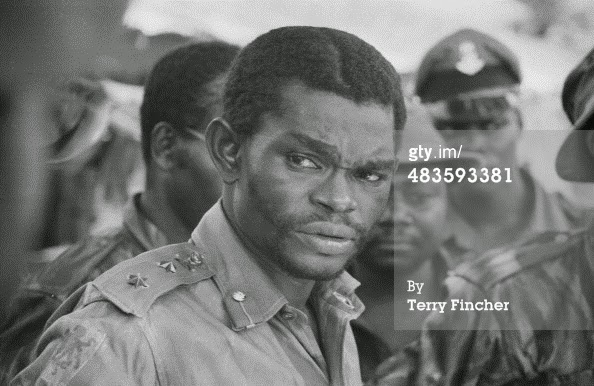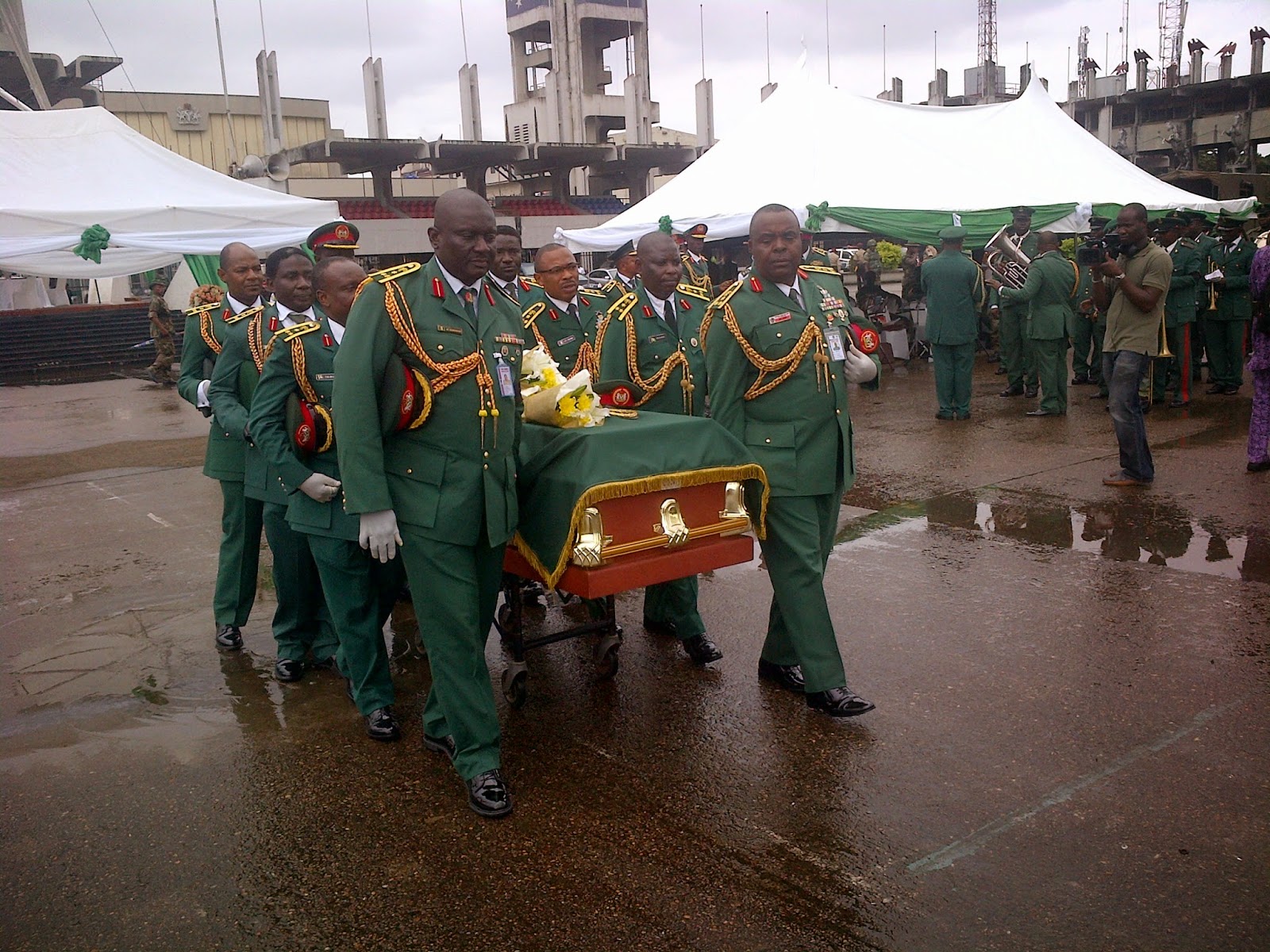[pull_quote_center]”For record purposes, however, let me state fearlessly that I saw hundreds of unarmed civilians being shot at sight in Benin City when Federal troops arrived to liberate the city from rebel soldiers… There appeared to be a fleeting period of lunacy in which Midwesterners gladly identified their Igbo compatriots to be shot down by Federal troops.” – Giwa Amu, the former Solicitor-General of Midwestern Nigeria, Sunday Observer, March 16, 1983.[/pull_quote_center]
“If you want to get to know the devil of Africa, just ask for Adekunle. He is the man who is responsible for the death of 100,000 Ibo people,” Mister Ikpa said to Randolph Baumann, a Stern reporter, in 1968. Ikpa was the official representative of the Republic of Biafra in Lisbon.
Randolph Baumann, who worked for the Stern Magazine in Germany, sought to speak with a front-line General in Nigeria’s macabre civil war, so he, like most western journalists of his time, made the an adventurous journey into the heart of Africa – to have a feel of the war, and of course, cater for his meal ticket.
“Adekunle does not like journalists,” Ikpa’s words echoed in Baumann’s head. “He had a man from England who disagreed with him shaved bald, do an hour of push-ups, and write one-thousand times: I am a crappy Englishman and don’t have a say in Nigeria,” Ikpa had further told him.
Having been thus forewarned, the Stern reporter flew to Port Harcourt, a big Biafran harbor city in the midst of a swamp and in the oil field of the Niger Delta, and requested an interview from the “devil” himself – Benjamin Adekunle.

Baumann was led to Major Adekunle, a 28-year-old general of the Nigerian troops on the South front. Adekunle sat enthroned behind the General’s desk of the Shell Administration, which he had made into his main station when he took the Igbo city by storm on May 18, 1968 and later took full control of the city on May 24, 1968.
“I am convinced you will report objectively and keep to our orders?” Adekunle queried when Baumann made his request for an interview. The German confirmed.
“Okay,” Adekunle beamed, “the Germans just know how war works. Tonight there is a front-party in my headquarters. You will come! An order is an order!”
The reporter went on to have his dream interview with one of the most important man on the Nigerian side of the war. The interview took place at a night party – whisky and beer were abundant, uniformed go-go girls played while Adekunle danced and petted his mascot, a small mountain goat named “Ojukwu.”
STERN: Your friends in the federal government of Lagos call you the “bloodhound of Nigeria.” You are chasing a whole people. You kill everything.
ADEKUNLE: Europeans are awful. They always generalize. My troops have kept prisoners. You have had a chance to convince yourself of this.
STERN: I only saw one prisoner, a fifteen-year old boy.
ADEKUNLE: There you are! In addition I want to emphasize that we do not murder all people who no longer want to remain members of the Nigeria Federation.
STERN: Does that mean that you do not want the extinction of the Ibos?
ADEKUNLE: The nation which the Ibos founded under the name of Biafra on May 30, 1967 is not a pure Ibo-federation. You Europeans should really know that by now. Seven million Ibos and five million other population groups are living now in the 80% overpopulated Biafra: Ibibios, Ijaws, Kalabaris, Ekios, Efiks, and Annangs. These minority populations in the Ibo nation have always hated the Ibos. Therefore they jubilantly welcome the liberation of their areas through federal troops.
STERN: What are your troops doing when they march into a town around Port Harcourt, an area where most of the farmers are not Ibos?
ADEKUNLE: We aim at everything that moves.
STERN: Small children tend not to stay put for very long.
ADEKUNLE: I know. I have two myself.
STERN: What will your troops do when you get to the Ibo heartland, that is, to the place populated by Ibos only?
ADEKUNLE: There we will aim at everything even if it is not moving.
STERN: Are you racist?
ADEKUNLE: You should know exactly where racists are. There is no such thing as racism in Nigeria.
STERN: But why are you refusing to discuss this war with a European?
ADEKUNLE: Let me tell you something: When the Russians surrounded Stalingrad did you request a land corridor from them so as to better feed your soldiers who were stuck in the pot there? Of course you didn’t and I can tell from your face that you think the thought of a land corridor to bring in food for the captured German soldiers in Stalingrad is a bad joke. Me too. Where and when was there a war in which the loser was re-nourished one more time before the final loss? Why are you just calling for a land corridor for Biafra? Why aren’t you calling for a land corridor for the Viet Kong? I have to declare: You Europeans are simply not competent!
STERN: What is happening to the European Humanitarian Assistance programs which were authorized through your government?
ADEKUNLE: In the section of the front that I rule—and that is the whole south front from Lagos to the border of Kamerun—I do not want to see the Red Cross, Caritas Aid, World Church delegation, Pope, Missionary, or UN delegation.
STERN: Does that mean that the many thousands of tons of food that are stored in Lagos will never get to the refugee camps in your section of the country?
ADEKUNLE: You are a sharp one, my friend. That’s exactly what I am saying.
STERN: But you said yourself that most of the refugees in the part you captured are not Ibos.
ADEKUNLE: But there could be Ibos among them. I want to avoid feeding a single Ibo as long as this whole people have not given up yet.
STERN: Do you sometimes feel sympathy for the Ibos?
ADEKUNLE: I have learned a word from the British, which is “sorry”! That’s how I want to respond to your question. I did not want this war but I want to win this war. Therefore I have to kill the Ibos. Sorry!
This interview was translated from German based on an interview granted by Major Benjamin Adekunle of the Nigerian Army to a German Reporter, Randolph Baumann, of STERN Magazine on August 18 1968 in Port Harcourt. The content of this interview is the property of Stern Magazine.







